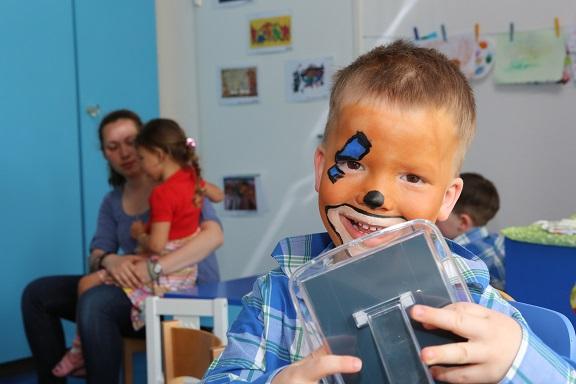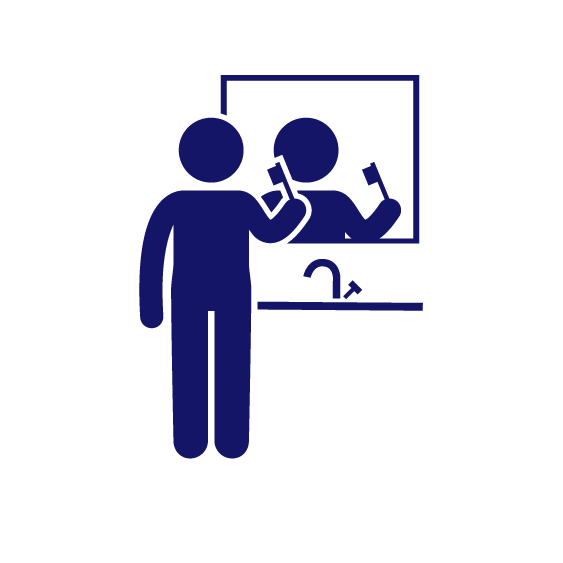Centre pioneers day care for children with disabilities

A crèche that offers half of its places to disabled children has been nominated for Switzerland’s first-ever Early Education Prize for its innovative approach to integration.
A group of children is playing quietly in a brightly decorated room; some are painting; others are involved in games. One boy is pretending to be a firefighter – Kinderhaus ImagoExternal link’s theme this year is water, in all its forms. Underwater creatures are painted on the windows.
Four of the eight children have disabilities, says Nina Wetzel, a senior staff member at the daycare service based in Dübendorf, near Zurich, as she showed swissinfo.ch around. It is not immediately clear which ones, so deeply involved are the children in their activities.
However, some of the children have their own carers. This includes one little blond boy, aged around four. His carer takes him through a short series of actions. “This little boy has autism,” Wetzel says. “He is learning to copy actions so he can better communicate.” Many autistic children find social interaction difficult, she explains.
These scenes nearly sum up the philosophy at Kinderhaus Imago: care for able-bodied and disabled children, side by side. Its concept, which includes children with severe disabilitiesExternal link such as cerebral palsy, is unique in Switzerland.
This has resulted in Kinderhaus Imago being shortlisted, along with four other early education institutions, for the CHF20,000 ($19,6000) Early Education PrizeExternal link, which was awarded by the nonprofit Forum Bildung (Education Forum) in a ceremony in Zurich on December 2. The prize was eventually awarded to the KSA Zwärglihuus daycare in Aarau, attached to the Aarau Cantonal Hospital.
Living integration
Sonja Kiechl, who runs the Kinderhaus Imago explains that some crèches in Switzerland take disabled children, but normally this is only a few children at a time and for 2-3 half days a week.
“We reserve half our places for disabled children and our whole daily routine is devoted to integration,” she says.
This means letting everyone take part in everything. So a child who cannot walk can play indoor football with his able-bodied fellows because his carer will seat him in goal. An autistic child is encouraged to do arts and crafts – group work being something he would never normally do.
Wetzel says staff work closely with the family and therapists to ensure the best possible support for the children.
Helga Budai, the mother of the autistic boy observed earlier, says that her son has made great progress over two years. “I think his development is so strong because he’s always in a group and he can learn from other children.”
Kiechl argues able-bodied children benefit too, also from the high staff-child ratio. “They develop very high social competence by Kindergarten age. They realise that being different is a normal thing. They may ask when someone new arrives why this child has a tube in her stomach. We explain it to them and then it’s ok.”
For parents
Childcare also means that parents, in particular mothers, are able to go out to work, offering them a change to what can often be a demanding daily routine with a disabled child, Kiechl adds.
The service is particularly important for single-parent families.
For Budai, it’s a great help that she can leave her child without worrying and that he comes home happy.
“I know that they love and accept him how he is and this is important because it’s not always like that in our society. Tolerance towards disabled children and adults is lower than at Imago.”
Where next?
She is looking at where she can next place her son, who is reaching Kindergarten age.
Some of the disabled children will be able to, with extra support, attend a regular Kindergarten after Imago. Others may go to a special needs kindergarten and later a special school.
The non-profit Visoparents AssociationExternal link, which set up Kinderhaus Imago in 2008, for example, runs a special day school in Oerlikon. Automatically putting disabled children in a home, as was done in former times, is now an outdated concept.
Visoparents, which started life in 1963 as an association set up by parents wanting better options for their disabled children, also offers help and advice for families.
Financing
One difficult issue is money. A place at Kinderhaus Imago can cost CHF420 a day for a child in the most severe disability category, due to the cost of extra care. A normal place costs CF120 a day for children, with babies costing CF125. Local authorities are under no obligation to fund early education places for disabled children. This only starts from Kindergarten age (from 4-5 years old).
“So it’s always about looking for money to finance these early education places,” Kiechl notes. She would like obligatory funding for early education for disabled children. “The earlier you start with disabled children the more success you have.”
The planned opening in January of a second Kinderhaus ImagoExternal link in the town of Baar in central Switzerland is proof that there is a demand for such care.
Overall, all three ladies would like to see integration become more of a normality.
“I believe that when a child learns that there’s nothing bad about being disabled, that everyone is special, and offers something, but that disabled people just need more support, then acceptance of people with disabilities would be a lot higher in our society,” Wetzel says.
Kinderhaus Imago
There are 90 children attending daycare – some are part-time – from three months of age. Apart from daily opening times of 7am to 6pm, Kinderhaus Imago also offers one night a week and one weekend month of care, as well as holiday cover. 36 people work there, including specially-trained care staff.
“We offer these relief services to families with special needs children so they can cover other needs, for example, that of siblings or so the couple can have a bit of time out,” said Kiechl, herself a mother of a disabled child.
Kinderhaus Imago partially relies on fundraising to offer its services.

In compliance with the JTI standards
More: SWI swissinfo.ch certified by the Journalism Trust Initiative












You can find an overview of ongoing debates with our journalists here . Please join us!
If you want to start a conversation about a topic raised in this article or want to report factual errors, email us at english@swissinfo.ch.